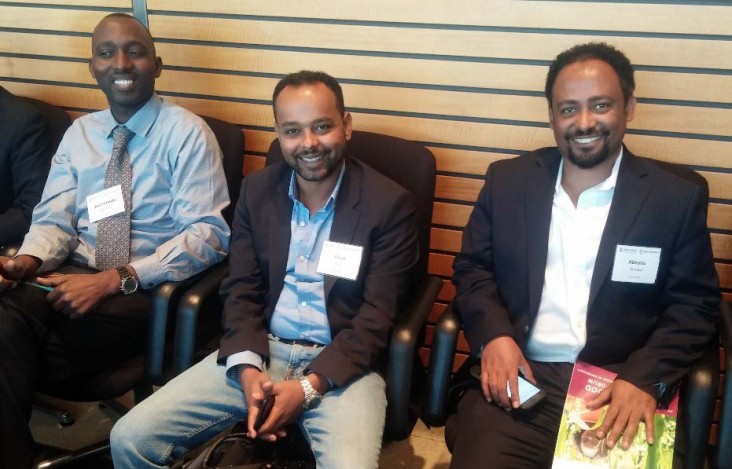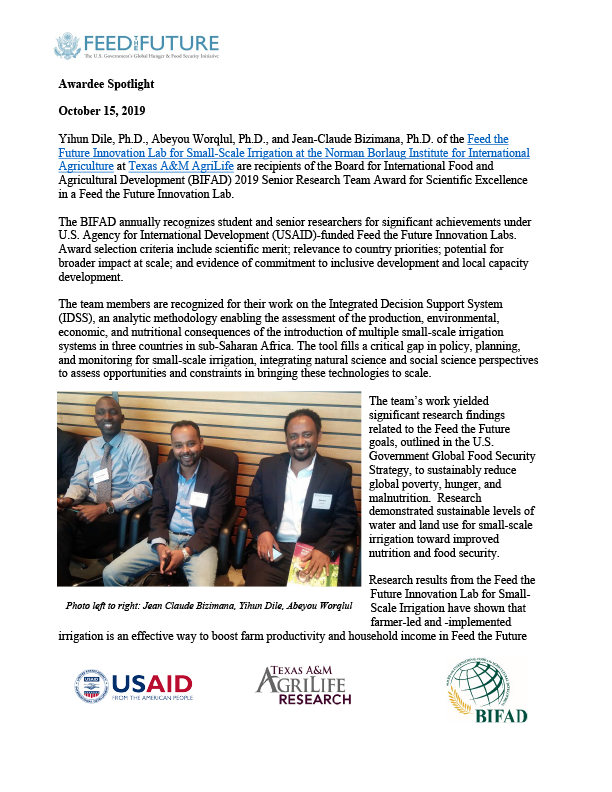Speeches Shim
Awardee Spotlight
October 15, 2019
Yihun Dile, Ph.D., Abeyou Worqlul, Ph.D., and Jean-Claude Bizimana, Ph.D. of the Feed the Future Innovation Lab for Small-Scale Irrigation at the Norman Borlaug Institute for International Agriculture at Texas A&M AgriLife are recipients of the Board for International Food and Agricultural Development (BIFAD) 2019 Senior Research Team Award for Scientific Excellence in a Feed the Future Innovation Lab.
The BIFAD annually recognizes student and senior researchers for significant achievements under U.S. Agency for International Development (USAID)-funded Feed the Future Innovation Labs. Award selection criteria include scientific merit; relevance to country priorities; potential for broader impact at scale; and evidence of commitment to inclusive development and local capacity development.
The team members are recognized for their work on the Integrated Decision Support System (IDSS), an analytic methodology enabling the assessment of the production, environmental, economic, and nutritional consequences of the introduction of multiple small-scale irrigation systems in three countries in sub-Saharan Africa. The tool fills a critical gap in policy, planning, and monitoring for small-scale irrigation, integrating natural science and social science perspectives to assess opportunities and constraints in bringing these technologies to scale.
The team’s work yielded significant research findings related to the Feed the Future goals, outlined in the U.S. Government Global Food Security Strategy, to sustainably reduce global poverty, hunger, and malnutrition. Research demonstrated sustainable levels of water and land use for small-scale irrigation toward improved nutrition and food security.

Research results from the Feed the Future Innovation Lab for Small-Scale Irrigation have shown that farmer-led and -implemented irrigation is an effective way to boost farm productivity and household income in Feed the Future countries. The project has also contributed to developing small-scale irrigation planning, implementation, and monitoring capacity among partners in Ghana, Ethiopia and Tanzania. The team fostered relationships with stakeholders to integrate the IDSS into curriculum at various national universities and into national planning institutions.
“This research has provided national governments in sub-Saharan African with robust information to integrate farmer-led irrigation into food security policies and programs,” said Nicole Lefore, director of the Feed the Future Innovation Lab for Small-Scale Irrigation. “The researchers have also been deeply committed to mentoring junior scientists, and they have contributed institutionally to Texas A&M—breaking down silos between departments and disciplines to build an integrated tool to support sustainable agricultural growth in developing countries.”
Dile received his Ph.D. in natural resource management from Stockholm University. He provided training on the use and application of the IDSS to technical experts, policy-level decision-makers, and graduate students. Worqlul received his Ph.D. in biological and environmental engineering from Cornell University. He contributed to the development and application of the IDSS framework and led an irrigation suitability study—the first of its kind—in Ethiopia and Ghana. Bizimana received his Ph.D. in agricultural economics from Texas A&M University. He conducted farm-level analysis to evaluate the economic and nutritional impacts of small-scale irrigation technologies on family farms.
“I am delighted to congratulate this excellent team of talented modelers in the Feed the Future Small-Scale Irrigation Innovation Lab,” said Dr. Mark E. Keenum, President of Mississippi State University and BIFAD Chair. “BIFAD appreciates their commitment to sharing their models with their African colleagues and ensuring that local data informed their predictions. The methods developed and used in Africa are very complementary to models being used at the farm, state, and national levels in the United States.”
The team presented its findings and was honored at an October 15 ceremony in Des Moines, Iowa, during World Food Prize Week.
The BIFAD is a presidentially appointed federal advisory committee to the U.S. Agency for International Development authorized under Title XII of the Foreign Assistance Act, as amended. The BIFAD’s main purpose is to bring the assets of U.S. higher education institutions to bear on development challenges in agriculture and food security.


Comment
Make a general inquiry or suggest an improvement.